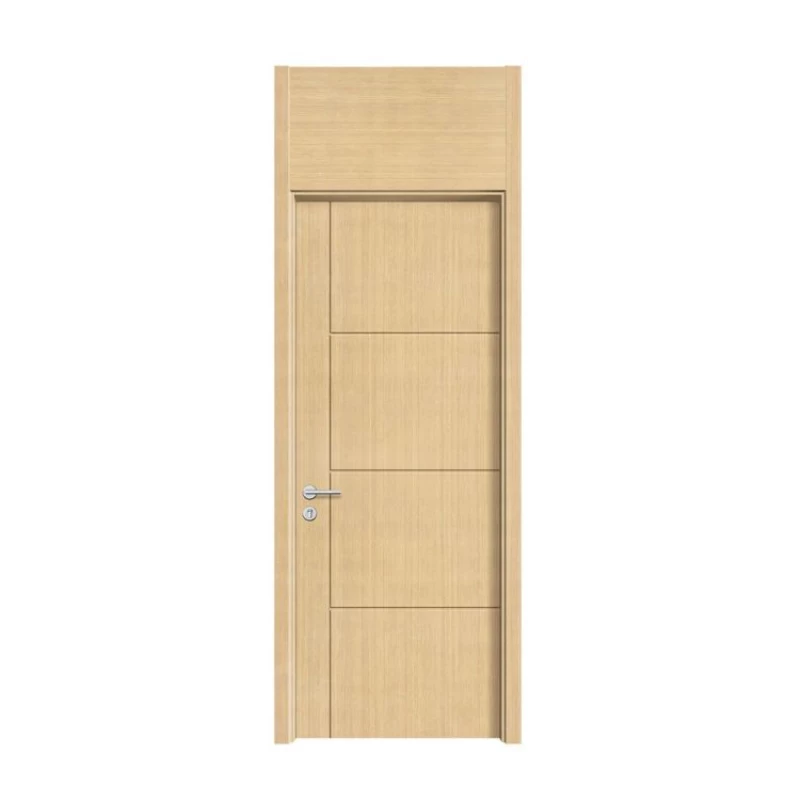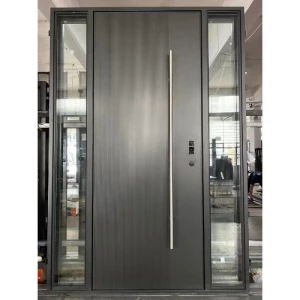Popular Design Single Interior Door for Home
- Standard Size
- 2050*960 (Accept Customization)
- Open Direction
- Inward/Outward/Left/Right
- Accessories
- Handle;Lock;Hinge;Peephole;Door Bell;Bolts
- The Finish of the Door
- 0.18mm PVC decorative paper
- Door Panel
- E1 5mm MDF
- Core Frame of Door Leaf
- 35mm fire door core
- Material
- Wood
Other recommendations for your business
Interior Doors: Hollow vs. Solid Construction
Introduction:
When it comes to interior doors(There are many types of interior doors), one common consideration is whether to choose hollow or solid construction. In this article, we will explore the differences between hollow and solid interior doors, highlighting their features and helping you make an informed decision.1. Hollow Interior Doors:(Usually a house needs about one exterior anti-theft door and five interior doors)
- Construction:- Hollow-core doors consist of a lightweight frame with cardboard honeycomb or wooden strips filling the core.
- Advantages:
- Cost-effective option, generally less expensive than solid doors.
- Lighter weight makes them easier to handle and install.
- Sound Transmission:
- Hollow doors offer less sound insulation, allowing sound to pass through more easily.
- Common Applications:
- Interior areas where noise reduction is not a major concern, such as closets or utility rooms.
2. Solid Interior Doors:(PVC film coated Interior doors are also a kind of indoor doors, which are slightly different from ordinary indoor doors.)
- Construction:- Solid-core doors are made of a solid material, usually wood or a composite material.
- Advantages:
- Durability and Strength:
- Solid doors are heavier and sturdier, providing better resistance to impacts and wear.
- They offer a more substantial and high-quality feel compared to hollow doors.
- Sound Insulation:
- Solid doors provide better sound insulation, reducing noise transmission between rooms.
- Enhanced Privacy:
- The solid construction offers improved privacy, especially in bedrooms or home offices.
- Common Applications:
- Rooms where noise control and privacy are essential, such as bedrooms or home offices.
3. Considerations for Choosing Between Hollow and Solid Doors:
- Budget:- Hollow doors are typically more affordable, making them a practical choice for cost-conscious homeowners.
- Solid doors may have a higher initial cost, but they offer long-term durability and quality.
- Purpose and Location:
- Consider the specific room and its function when choosing between hollow and solid doors.
- Solid doors are preferable for areas where noise control and privacy are important.
- Hollow doors are suitable for areas where sound insulation is not a priority.
- Aesthetic Preference:
- Both hollow and solid doors come in a variety of designs, so consider the style and aesthetic of your space.
- Solid doors often provide a more classic and substantial appearance, while hollow doors can be more contemporary.
Conclusion:
The decision between hollow and solid interior doors depends on various factors, including budget, purpose, and aesthetic preference. Hollow doors are cost-effective and suitable for areas where noise control is not a major concern. Solid doors offer enhanced durability, sound insulation, and privacy, making them ideal for bedrooms and home offices. Consider your specific needs and priorities to choose the best interior door construction for your home. If you have any questions, please ask USELUCK DOOR.
Supplier's popular products
Contact Supplier
We have more categories for you. lf you can't find the products you want above,just fill in the form and tell us whatproducts you want to import from China.





















